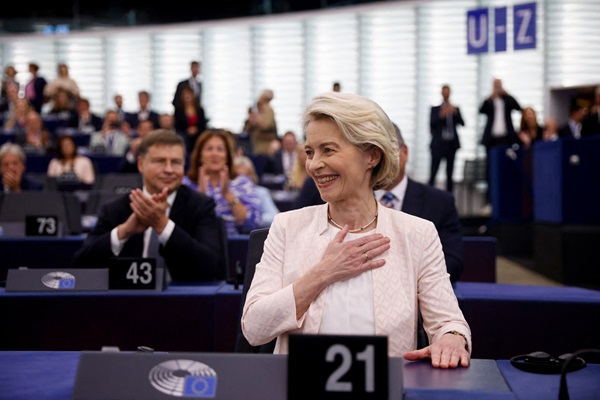 Ursula von der Leyen reacts after being chosen President of the European Commission for a second term, at the European Parliament in Strasbourg, France, 18 July 2024;
Credit: Reuters/Johanna Geron
Ursula von der Leyen reacts after being chosen President of the European Commission for a second term, at the European Parliament in Strasbourg, France, 18 July 2024;
Credit: Reuters/Johanna Geron
STRASBOURG (Reuters) - Ursula von der Leyen won a second term as president of the European Commission on Thursday 18 July 2024 after pledging to create a continental "defence union" and to stay the course on Europe's green transition while cushioning its burden on industry.
Members of the European Parliament backed von der Leyen's bid for another five-year term at the helm of the European Union's powerful executive body with 401 votes in her favour and 284 against in a secret ballot in the 720-member chamber.
In an address to the Parliament in Strasbourg earlier in the day, von der Leyen, 65, laid out a programme focused on prosperity and security, shaped by the challenges of Russia's war in Ukraine, global economic competition and climate change.
"The next five years will define Europe’s place in the world for the next five decades. It will decide whether we shape our own future or let it be shaped by events or by others," von der Leyen said ahead of the vote.
She stressed the need not to backtrack on the "Green Deal" transformation of the EU economy to fight climate change - a key pledge for Green lawmakers, who joined her core coalition of centre-right, centre-left and liberal groups in supporting her.
After pledging to support Ukraine for as long as it takes in its fight against Russia, von der Leyen said Europe's liberty was at stake and that it must invest more in defence.
Asked after the vote about the possibility of facing a protectionist and isolationist US administration under Donald Trump, von der Leyen said the EU was working on "reducing our dependencies" irrespective of elections elsewhere.
"We will work closely with our friends and allies, that is absolutely clear," she told reporters. "But that does also include that we are building our own strength."
Defence
Von der Leyen, a centre-right former German defence minister, pledged to create "a true European Defence Union", with flagship projects on air and cyber defence.
The plan sparked criticism from the Kremlin, which said it reflected an attitude of "militarisation [and] confrontation".
In her speech to the European Parliament, von der Leyen blasted Hungarian Prime Minister Viktor Orban's recent visit to Russian President Vladimir Putin in Moscow as an "appeasement mission", winning broad applause from lawmakers.
Defence policy in Europe has traditionally been the domain of national governments and NATO.
But following Russia's attack on Ukraine and amid uncertainty over how much Europe will be able to rely on the United States for its protection should Trump win the US presidential election in November, the European Commission is seeking to push more joint European defence projects.
Von der Leyen also promised climate policies including a legally binding EU target to cut emissions by 90% by 2040, compared to 1990 levels.
She pledged new measures to help European industries stay competitive while they invest in curbing emissions.
Green support
The Greens' decision to join the informal alliance of parties that supported von der Leyen ensured her margin of victory was fairly comfortable. She needed 361 votes to secure a majority in the chamber.
Her core coalition has 401 seats but some of its members were expected to vote against her in the secret ballot.
Von der Leyen also promised tighter EU border controls and stronger police cooperation against crime.
But that was not enough to secure the support of Italian Prime Minister Giorgia Meloni's right-wing Brothers of Italy party, which said it had voted against her.
Von der Leyen's re-election provides continuity in the European Union's key institution at a time of external and internal challenges - including mounting support for far-right and eurosceptic political parties in the 27-nation bloc.
In the coming weeks, she will propose her team of commissioners, who will face individual hearings from lawmakers before a final vote on the whole Commission later in the year.








